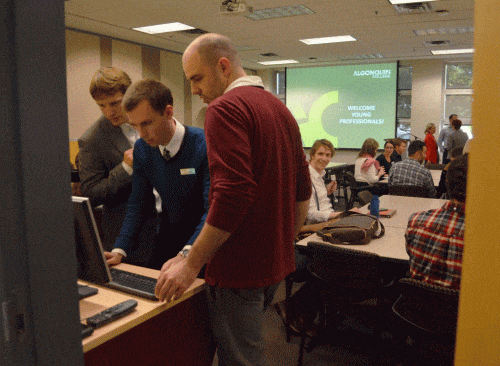By Alicia Gosselin

Eight Algonquin employees “did their thing” on Sept. 24 at the new Young Professionals Rapido event where they shared their personal ideas and professional knowledge with a room full of colleagues.
Each presenter had five minutes and 10 PowerPoint slides to get their point across. Some of the topics included Mentorship, Lego and Science, Social Media in the Classroom and International Teaching.
“We have so many talented experts at the college with a lot of knowledge and passion for different topics,” said Phil Gaudreau, an Algonquin communications officer and co-chair of the Young Professionals Committee. “They don’t always get a chance to do their thing.”
Michael Anderson, a professor of information and communications technology, spoke about the barrier that technology can pose on learning. He invited all faculty and staff to ban the use of laptops and mobile devices in the classroom during lectures.
All eight presenters gave fast-paced presentations and stayed within the time limit.
Although the event introduced fast-paced and diverse topics from faculty and staff, the overall message of the event was clear – creating opportunities for young professionals all comes down to networking.
“It’s not always what you know… it’s who you know to get ahead,” said Stephanie Martin, a recruitment officer at Algonquin and one of nine members on the Young Professionals Committee. “The purpose of this group is for employees or anyone new in their career to learn from a variety of fellow experts and build connections.”
We have so many talented experts at the college with a lot of knowledge and passion for different topics.
This is the second event since August when the Young Professionals Committee launched their 2014 pilot initiative in response to a college-wide interest a professional network.
Martin said they may look to reach out to students once they’ve moved past the pilot stage.
Gaudreau, who originally thought of the idea for a network, said he saw the potential to model other organizations who currently have successful young professional associations.
According to Gaudreau, the next steps of the pilot are still being worked out. After pitching the idea to Gerry Barker, the vice-president of human resources, the committee must determine what value it brings to the college. There is a lot of focus on getting employees more engaged, noting that students will be the benefactor of that.
“There’s a few ways for growth, so we will have to narrow the focus and figure out which are the best opportunities to pursue,” said Gaudreau. “If a student showed some interest in having a networking group similar to this, we could definitely be a contact for mentoring.”
Ralph Hatem, a process improvement analyst at Algonquin and Young Professionals Committee member, also said that if students wanted to create their own networking group, there could be a cross-over opportunity by using Young Professionals as a model.
“It’s all about bringing people together,” said Hatem, who started working full-time at the college last year and joined the committee as a way to become involved in the community.


